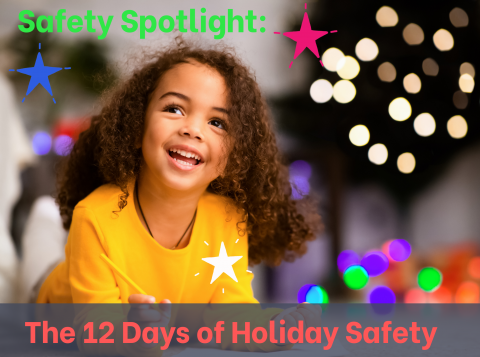It’s easy to get caught up in holiday festivities, and while you are decorating, cooking, shopping and entertaining, safety may be one of the last things on your mind. And not to be a Scrooge, but it is during times like these, when you are busy and out of your regular routine, that unintentional injuries can occur, especially if you have toddler-age children who are into everything! But don’t fear, pour a glass of eggnog and brush up on the most important safety tips that will help you and your family enjoy a wonderful, injury-free holiday!
- On the 1st day: Prepare your home for safe holidays! Double check that you have working smoke alarms, carbon monoxide detector, fire extinguisher and a first aid kit.
- On the 2nd day: Decorate with safety in mind. Secure Christmas trees and other heavy decorations to the wall. Be aware that excited toddlers may try to climb up on things to touch a decoration.
- On the 3rd day: Keep lights bright. Make sure all holiday lights are in good condition without frayed cords or broken parts. Never run cords under carpets or through doorways. Turn off all indoor and outdoor holiday lights before you go to bed or leave your home.
- On the 4th day: Make sure your tree is safe. Use unbreakable ornaments, or keep the glass ones away from small children and pets. If you have a real tree, keep it watered so it doesn’t dry out, and place it away from radiators, stoves, fireplaces and burning candles.
- On the 5th day: Secure candles. Never leave a lit candle unattended. Cut candle wicks short to prevent a high flame, and if candles are used in a centerpiece, make sure they don’t burn low enough to set the decoration on fire. Children should always be supervised around open flames.
- On the 6th day: Be aware of toxic holiday plants. Poinsettia are safe but should be kept away from small children: leaves that fall to the floor may be a choking hazard and eating leaves could cause a mild stomach upset. Holly berries and all parts of the mistletoe plant are toxic if eaten and can cause nausea, vomiting and diarrhea. If your child has eaten any of these, call the Atlantic Canada Poison Centre for advice at 1-844-POISON-X and their poison specialists will advise you what you should do.
- On the 7th day: Choose appropriate toys for your kids. Before your child opens and plays with a new toy, check the labelling to make sure it is age-appropriate. Sometimes a well-meaning friend or family member can unintentionally buy your child a toy with parts that are too small for their age. Also pay attention to Health Canada’s recalls and safety alerts here.
- On the 8th day: Plan for safety! If Santa brings toboggans, skates, skateboards or bikes, make sure he also brings helmets and other protective gear needed for those sports.
- On the 9th day: Keep tiny things away from small children. Don’t leave candy or nut dishes within reach on a coffee table. Many holiday items contain these tiny button batteries, which can cause devastating injury if swallowed by a curious toddler.
- On the 10th day: Be wary of potential poisons your guests may carry in their purses or other bags. Items like medication, nicotine or cannabis products, some cosmetics and hand sanitizers are common in handbags, as well as small items like coins and batteries that can be choking hazards. Make sure handbags are stored up high, away from small children.
- On the 11th day: Travel safely. Always make sure your child is in a properly fitting car seat, appropriate for his or her age and stage. Snowsuits or bulky winter jackets are not safe for children to wear in their car seats; choose thin layers instead so the straps fit properly, and tuck a cozy blanket over them after they are safely buckled in.
- On the 12th day: Hang your stockings by the chimney with care by using a strong, removable hooks instead of heavy weighted stocking hooks that can fall down on a child if the stocking is tugged from below.
Here’s wishing you a wonderfully fun and safe holiday season, from the staff at Child Safety Link!
